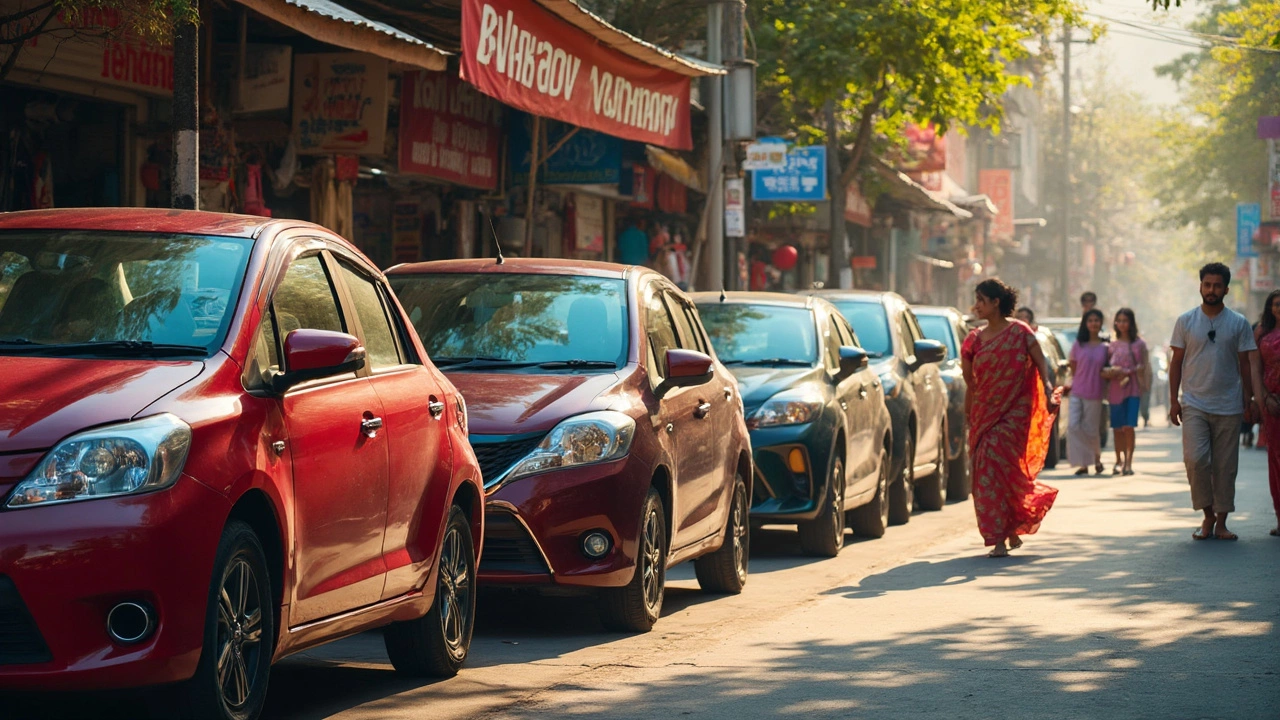Ever noticed how many cars on Indian roads carry those familiar badges from Japan? There’s a reason for that. When it comes to reliability and value, Japanese car brands have carved out a special place in the hearts of Indian drivers. If you’re hunting for a new ride or just plain curious, knowing which brands hail from Japan makes it easier to spot quality—or to spark a quick conversation with your friends.
Here’s something a lot of folks don’t realize: Not every foreign-sounding car brand on Indian streets comes from the same country. Toyota, Honda, Suzuki (hello, Maruti Suzuki!), Nissan, and Mitsubishi are all born in Japan and have built their reputation over decades. These companies didn’t just drop cars into Indian showrooms—they set up factories, created jobs, and adjusted their cars for Indian needs like fuel efficiency, lower maintenance, and handling bad roads.
- Spotting Japanese Brands in India
- Why Japan’s Cars Stand Out
- Popular Japanese Brands on Indian Roads
- Tips for Buying a Japanese Car Here
Spotting Japanese Brands in India
So, how can you actually tell if a car kicking up dust on the highway is rocking a Japanese car brand? It’s pretty simple once you know what to look for. First off, check the company badge or logo. Big players straight from Japan in India include Toyota, Honda, Nissan, Mitsubishi, and, of course, Maruti Suzuki. Fun fact: Maruti started as an Indian company but most of its cars are powered by Suzuki—the Japanese giant behind its tech and design.
Here’s a cheat sheet for the most popular Japan car brands in India and their easily recognizable badges:
- Toyota: Overlapping ovals in the logo
- Honda: Bold "H" in a box
- Nissan: Circle around the name "Nissan"
- Mitsubishi: Red three-diamond symbol
- Maruti Suzuki: S for Suzuki, wing motif for Maruti
Feeling confused because you see so many Marutis? You’re not alone. Nearly one in every two new cars sold in India carries a Maruti Suzuki badge. That’s because Suzuki, Japan’s powerhouse brand, holds a controlling stake in Maruti. Turns out, you’re driving Japanese engineering even if it says Maruti on the back!
| Brand | Original Country | Main Indian Models |
|---|---|---|
| Toyota | Japan | Innova Crysta, Fortuner, Glanza |
| Honda | Japan | City, Amaze, WR-V |
| Nissan | Japan | Magnite, Kicks |
| Mitsubishi | Japan | Pajero, Outlander |
| Maruti Suzuki | Japan (Suzuki) | Alto, Swift, Baleno, Brezza |
If you want to dig deeper, check the tiny "Made in" labels usually found near the driver’s door or the car manual. Even if a Japanese car brand builds the car here, most engines and tech are by their Japanese parent companies.
Why Japan’s Cars Stand Out
When you talk about Japanese car brands, one thing pops up fast—reliability. Cars from Japan are known to last for years without giving you a headache. People joke that you can run a Toyota or Suzuki for a lifetime if you just keep up with basic maintenance. That’s no accident. These brands put loads of research and strict quality checks into every car they make. It’s a habit—they’ve been doing this since the 1960s.
Let’s look at why these cars keep getting recommended in India:
- Fuel Efficiency: With fuel prices always on the rise, people want cars that sip, not gulp, petrol or diesel. Honda’s i-VTEC engines and Suzuki’s smart hybrid options are good examples of why their models are so popular here.
- Low Maintenance: Indian families want trouble-free ownership. Parts for Japan cars India are easy to find and reasonably priced. You won’t have to wait months for a spare or shell out a fortune on repairs.
- Resale Value: Japanese cars typically fetch a better price when you sell them used. Check any classified site—Maruti, Honda, and Toyota models never gather much dust before being snapped up.
- Adapted for Local Needs: These companies don’t just export cars; they design for Indian roads. Higher ground clearance, strong suspensions, and models that can handle potholes without breaking down.
Want numbers? In 2024, Maruti Suzuki alone sold over 1.7 million cars in India, making it the most-sold car brand here by a huge margin. Check the table for a quick comparison:
| Brand | Share of Indian Car Market (2024) | Known For |
|---|---|---|
| Maruti Suzuki | 42% | Affordability, fuel efficiency |
| Toyota | 8% | Durability, resale value |
| Honda | 5% | Engine tech, comfort |
If you need a car that just works and doesn’t empty your wallet, it’s tough to beat these Japanese names. Every time you see someone driving a ten-year-old Honda City or Maruti Swift without a worry, you’re seeing this reputation in action.

Popular Japanese Brands on Indian Roads
If you're looking around at traffic jams or parking lots in India, it’s impossible to miss the stamp of Japanese car brands everywhere. Japanese car brands have really nailed what Indian buyers want—reliability, efficiency, and a price that makes sense for families. Let’s cut through the clutter and spotlight the biggest names you’ll actually see every day.
- Maruti Suzuki: This is probably the first name that pops up when you think of cars in India. Suzuki entered the Indian market decades ago and became a household name through its joint venture, Maruti Suzuki. From the legendary 800 to the latest Alto, Swift, and Dzire, Maruti cars have ruled Indian roads for years. In 2024, Maruti Suzuki held over 41% of the passenger car market share in India. That’s massive.
- Toyota: Known for the Innova and Fortuner, Toyota has a rep for tough, low-maintenance vehicles. Their partnership with Suzuki even brought more budget-friendly cars, blending Maruti’s cost-effectiveness with Toyota’s reliability.
- Honda: Whether it’s the City, Amaze, or the old favourite, the CR-V, Honda enjoys a loyal fanbase here, especially among folks who want peppy engines and smooth driving. Honda’s focus on fuel efficiency and comfort keeps it right up there in urban markets.
- Nissan: Not as big as Maruti, but certainly present with models like the Magnite, which has done surprisingly well for an affordable SUV. Nissan’s Datsun brand tried its luck here too, but recently bowed out due to slow sales.
- Mitsubishi: Mitsubishi had its fan moments with models like the Pajero but stepped back from the Indian passenger car market a while ago. Still, the legacy remains, especially among old-school car fans.
Here’s a quick market snapshot:
| Brand | Popular Models | Market Share (%) |
|---|---|---|
| Maruti Suzuki | Alto, Swift, Dzire, WagonR | 41 |
| Toyota | Innova Crysta, Fortuner, Glanza | 5.5 |
| Honda | City, Amaze, Jazz | 3 |
| Nissan | Magnite, Kicks | 1.2 |
What makes Japanese brands so consistent here? Value and after-sales support play a big role. Local manufacturing and service networks give them a huge edge over expensive imports. As the Economic Times once put it:
"Japanese carmakers reshaped India’s roads by focusing on low-cost, high-value cars and building local relationships with millions of drivers."
If you walk into any car dealership or browse the second-hand market, you’ll see Japanese car brands leading the pack—both for new buyers and those searching for dependable used cars. Their staying power isn’t just luck; it’s the result of decades of tweaking their cars for exactly what Indian drivers want and need.
Tips for Buying a Japanese Car Here
When you're thinking about picking up a Japanese car brand in India, there are a few things that can save you money and headaches down the road. Start by zeroing in on what matters to you—are you after crazy fuel efficiency, low maintenance, or rock-solid resale value? Brands like Toyota and Maruti Suzuki shine in these areas. In fact, Maruti Suzuki handles almost half of all car sales in India, which tells you how much trust they’ve earned here.
Check out where the car is made. Many Japanese brands have local manufacturing plants—Maruti Suzuki and Honda both make a lot of their cars right here in India—so you often get lower prices, more spare parts, and sometimes even shorter waiting times. Look at aftersales support too. A good dealer network and easy-to-find workshops for brands like Toyota, Honda, and Nissan mean you’re not stuck searching for help if something goes wrong.
- Go for proven models: Vehicles like the Maruti Suzuki Swift, Toyota Innova, and Honda City have been tested on our roads for years and are known for their reliability and low running costs.
- Compare service costs: Ask about service packages and check labor and parts prices at local dealerships. Japanese car brands are usually cheaper to maintain here, but it’s worth comparing notes.
- Check for localized features: Cars built or tweaked for India, like higher ground clearance or ACs that handle extreme heat, can make a big difference in daily use.
- Pay attention to resale value: Popular Japanese cars tend to hold their price longer, thanks to their tough-as-nails reputation.
- Look out for offers: During festival seasons, dealers run real deals on Japanese car brands that can shave off a good chunk of the price or toss in free services.
To really see the difference, look at this quick comparison of service costs for some top Japan cars India models:
| Model | Average Yearly Service Cost (INR) | Availability of Spare Parts |
|---|---|---|
| Maruti Suzuki Swift | 6,000 | Very Easy |
| Toyota Innova | 7,500 | Easy |
| Honda City | 8,000 | Easy |
| Nissan Magnite | 7,200 | Moderate |
So if you’re chasing peace of mind, strong resale, and fewer trips to the garage, sticking with a Japanese car brand in India still makes a lot of sense. Just do your homework, talk to current owners, and don’t let that sales pitch rush you into anything.
